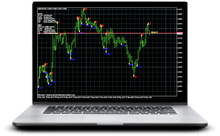Spread Betting
Spread Betting
What is spread betting?
The main principle of spread betting is the ability to set a trader's own rate for each point of price change and exclude the actual acquisition of an asset.
A spread betting company quotes the bid and ask price (also called the spread). Investors bet whether a security price will be lower than the bid or higher than the ask.
Bid prices refer to the highest price that traders are willing to pay for a security. On the other hand, the ask price refers to the lowest price the security owners would like to sell it for.
Spread betting vs. CFDs
- CFD trading requires investors to pay commission charges and transaction fees to the provider. In contrast, spread betting companies do not take fees or commissions. When the contract is closed, and profits or losses are realized, the investor either gets a payment or owes money to the trading company. CFD trader receives a net profit of closing, less opening, and fees.
- Profits for spread bets will change in basis points multiplied by the dollar amount negotiated in the initial bet.
- CFD is a financial instrument, while spread betting is about gambling.
Spread betting benefits
- Traders can bet on rising and falling prices. When investors are trading with physical assets, they need to borrow them from brokers to short-sell, which is time and money-consuming. Spread betting excludes a need to borrow assets from a broker and makes short selling as simple as buying.
- Spread betting companies do not take any commission changes, making it easier for investors to monitor trading costs and work out their position size. These companies make money through the spread they offer.
- Spread betting is considered gambling in some tax jurisdictions, and subsequently, any realized gains may be taxable as winnings and not capital gains or income.
- Spread betting allows traders to place take profits and stop losses, allowing traders to define an exact trade target and prevent deposit losses.
Spread betting risks
High volatility provides traders with a wide range of opportunities and raises the risk of losing capital. Spread betting is not an exception.
- Market volatility and rapid price changes can cause the balance to change quickly. If a wallet balance falls below the close-out level and a trader does not have sufficient funds, a risk that a platform will automatically close his/her positions occurs.
- As a trader, it's important to remember that market volatility can sometimes cause prices to move from one level to another without passing through the level in between. Gapping (also known as slippage) usually occurs during periods of high volatility and can execute a trader's stop loss order at a level worse than he/she had requested increasing losses. On the other hand, if a price moves according to a trader's predictions and passes a take profit order, gains will exceed expectations.
Spread betting has less in common with a financial market than with gambling, as traders do not own any securities or affect market volatility.
2022-04-13 • Updated











